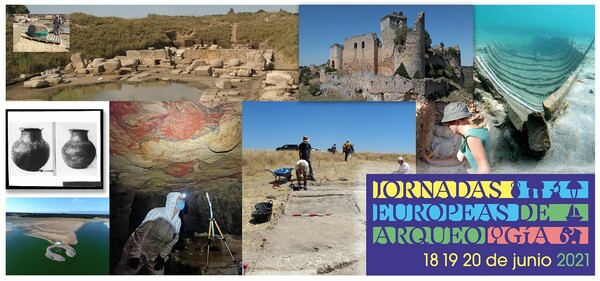Trailer JEA 2024
The European Archaeology Days (EAD):

© Ministry of Culture and Sports, Government of Spain
Since 2010, the French Ministry of Culture has entrusted the National Institute for Preventive Archaeological Research (INRAP) with the co-ordination and promotion of France’s National Archaeology Days (JNA).
During these Archaeology Days, all those involved in archaeology mobilise to introduce the public to the treasures of their national heritage and the secrets of the profession. Archaeological excavation operators, research organisations, universities, museums and archaeological sites, laboratories, associations, archives and local authorities are all encouraged to organise innovative, original and interactive activities for the general public.
In 2019, the JNA expanded to all of Europe. For the first enlarged event, seventeen countries participated.
In 2020, France’s National Archaeology Days became the European Archaeology Days (EAD).
With more than 1,400 initiatives in Europe and 26 European countries participating, the 2021 European Archaeological Days were a hit! Europe’s countries came out in full force once again for the event, offering more than 830 initiatives, and guaranteeing the days’ success. More than 570 events were held across France. Throughout these three days, the public had the opportunity to take in an abundant programme offered by all those who make archaeology today.
With over 1,500 initiatives in Europe and the participation of 30 European countries, the EAD 2022 took the momentum even further. More than 630 events took place all across France: excavation sites exceptionally open to the public, educational and fun activities, archaeology villages, meetings with researchers, visits to laboratories, exhibitions, projections, etc. 13 Archaeology Villages in large cities were also offered fun and festive activities for all audiences.
Video: an introduction to ceramology workshop for schoolchildren; children dig up ceramic shards that need to be reassembled in order to discover an object.
National Institute of Preventive Archaeological Research (INRAP):
Created by the 2001 Act on Preventive Archaeology, the National Institute for Preventive Archaeological Research is a French public establishment under the authority of the Ministries of Culture and Research. Its 2,200 agents, spread across eight regional and interregional departments, 42 research centres and a head office in Paris, make it the largest European archaeological research operator.
It identifies and examines archaeological heritage prior to land development. It is empowered across the territory, for all periods, from prehistory to the present day. It conducts its work in all types of contexts: urban, rural, subaquatic and subsea, motorway and rail routes, electricity or gas grids.
As a national research institute, it carries out around 1,800 archaeological surveys and 200 excavations each year, on behalf of private and public developers in mainland France and its overseas territories.
Upon conclusion of the projects, INRAP analyses and interprets the excavation data and makes it available to the scientific community. The leading producer of archaeological data and publications in France and Europe, the Institute makes a decisive contribution to the development of archaeological and historical knowledge as well as to the major issues of our times: migration, climate, environment, health, knowledge of territories, economy, etc.
Its remit also includes the dissemination of archaeological knowledge to the widest possible audience. In this capacity, it organises numerous outreach operations, most often in collaboration with developers: site tours, exhibitions, publications, audio-visual content, and conferences. Every year on the third weekend of June, across the national territory and in the Member Countries of the Council of Europe, it organises the European Archaeology Days under the aegis of the Ministry of Culture in partnership with public cultural and scientific institutions and local authorities.
Event objectives
The European Archaeology Days (JEA) encourage public authorities and archaeology stakeholders to promote archaeological heritage. They are based on a digital platform, journees-archeologie.fr, bringing to the attention of the public the multiplicity and diversity of heritage and initiatives relating to archaeology in Europe. They facilitate the creation of a network of archaeology stakeholders in all member countries of the Council of Europe.
The main objectives of the JEA are to:
- raise awareness among European citizens of the richness and cultural diversity of Europe;
- make archaeology more visible to different audiences and the media;
- make the general public and the political authorities aware of the need to protect archaeological heritage;
- to enable the public to grasp the mosaic of Europe’s cultures;
- attract new audiences who are not accustomed to visiting the places where archaeology is carried out;
- promote to the public the entire archaeology operating chain, "from dig to museum”;
- promote the sharing of knowledge between archaeology professionals and European citizens.
To this end, the JEA take place every year on the third weekend of June in all member countries of the Council of Europe.

